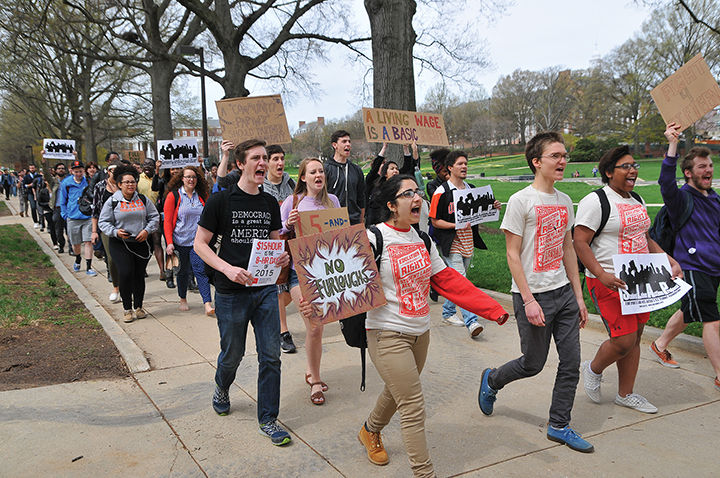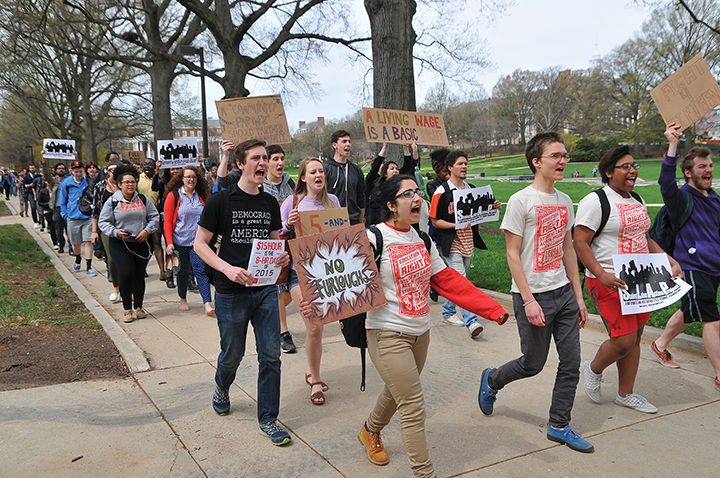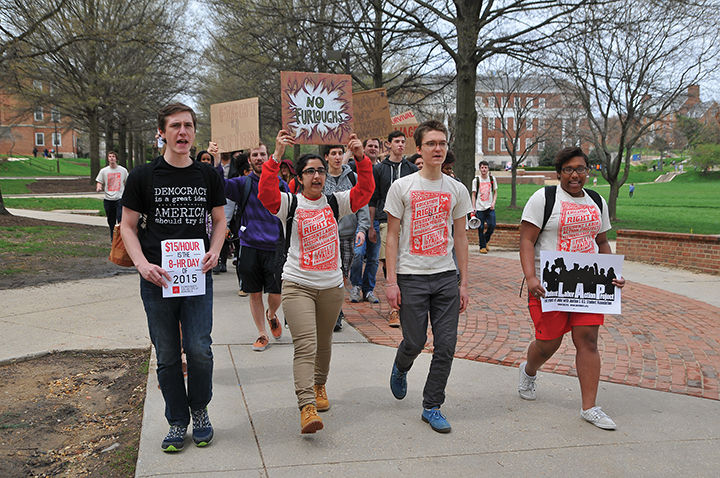Undergraduate and graduate students rallied Wednesday to pressure the University of Maryland administration to raise campus wages and expand contingent workers’ rights.
About 50 people attended the Fight for $15 Walk-out, organized by this university’s chapter of the Student Labor Action Project, an economic justice group. The group gathered outside McKeldin Library at about 11:45 a.m. to share their views.
Chris Bangert-Drowns, SLAP co-president, said the event was an effort to show student solidarity with the campus workforce, which he labeled “the foundation of the university.”
Fight for $15 is a national movement that began when a group of fast-food workers in November 2012 protested low pay and called for a $15 minimum wage. The movement has since gained momentum, and Thursday workers and other demonstrators across the country are rallying for increased wages.
“It’s not a far-fetched idea,” Bangert-Drowns said. “For decades now, wages have remained stagnant — especially the minimum wage — all at a time when corporate profitability and growth have reached new and unprecedented heights, and we don’t see the university as being an exception to this.”
This state’s minimum wage is $8 an hour and is set to increase to $8.25 an hour July 1. The Prince George’s County minimum wage is $8.40 an hour.
The living wage for a single person in Prince George’s County is about $13.20, according to the Massachusetts Institute of Technology’s living wage calculator.
“That jumps to $25.02 for one person with one dependent,” he said. “Given the fact that a lot of workers on campus have families to support, in no way is the wage on campus that’s being paid to most workers a sustainable wage.”
The group marched down McKeldin Mall toward the Main Administration Building, chanting, “Loh, step off it, put workers over profit.” Five SLAP members then went inside and delivered a letter to the administration.
Bangert-Drowns said administration agreed to meet with SLAP to discuss the group’s concerns.
Communication doctoral candidate Yvonne Slosarski said she spoke on behalf of graduate assistants on the campus, who she said feel they are not adequately compensated.
“The university works because we do, and the university works because you all do,” Slosarski said. “Now it’s time for the university to do what it needs to do for workers. And importantly, that includes graduate assistants.”
Homa Hajarian, a freshman English major and SLAP member, said the campus workforce is “overworked and underpaid.”
“They don’t make a living wage,” Hajarian said. “This is an issue that needs to be addressed.”
University Human Resources Assistant Vice President Jewel Washington said the entry-level wage for a full-time university employee is $10.98 an hour. Many contingent workers — who are considered part-time or temporary employees — including some Dining Services workers and housekeepers are paid this wage and some have the ability to negotiate benefits, Washington said.
Other seasonal or intermittent workers who do not work full time do not receive the same benefits. Washington said these benefits include subsidized medical care, tuition remission and paid days off.
“We’re actually ahead of the game when it comes to minimum wage, because if you look at all the benefits and everything … we’re actually above the $15 an hour,” Washington said, adding that the administration is open to meeting with SLAP. “I don’t think you can just take base pay; you have to look at everything.”
Don Mitchell, a union member and electrician for Residential Facilities at this university, said campus wages are low considering the skill and responsibility required for positions.
Greater worker involvement and solidarity among the campus community could help create progress, he said, adding that he hopes for a more civil work environment in the future.
“Everybody wants money, but here you don’t even get respect [from your employer],” Mitchell said. “You just feel like you never win.”
SLAP suggested this university could finance a wage increase by reappropriating wages from the top-income earners to the bottom-income earners, allocating funds from capital construction projects or lobbying Annapolis for funds earmarked for wage increases.
“It’s really a matter of convincing administration that this is one, feasible, and two, ethically necessary, both of which I believe are pretty apparent,” Bangert-Drowns said.
Students marched from McKeldin library to the steps of the administration building to protest low wages and inequality for employees of the university as part of a “walk out” organized by the Student Labor Action Project on April 15, 2015.
(From left) Students Nathen Sparks, Homa Hajarian, Oliver Owens, and Adrienne Edwards march from McKeldin library to the steps of the administration building to protest low wages and inequality for employees of the university as part of a “walk out” organized by the Student Labor Action Project on April 15, 2015.





